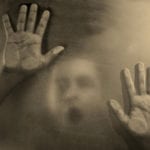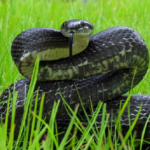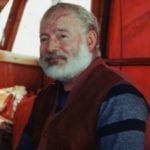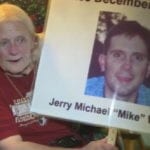 Creepy
Creepy  Creepy
Creepy  Movies and TV
Movies and TV 10 Movies That Get Elite Jobs Right, According to Experts
 Weird Stuff
Weird Stuff 10 Times Real Laws Were Based on Bizarre Hypotheticals
 Animals
Animals 10 Inspiring Tales of Horses Being Human
 Mysteries
Mysteries Top 10 Haunting Facts About the Ghost Ship MV Alta
 History
History 10 Surprising Stories About the Texas Rangers
 Humans
Humans 10 Philosophers Who Were Driven Mad by Their Own Theories
 Miscellaneous
Miscellaneous 10 Video-Game-Worthy Weapons and Armors from History
 Weird Stuff
Weird Stuff 10 Psychics Who Accurately Predicted Wartime Events
 The Arts
The Arts 10 Pieces of Art Inspired by a Broken Heart
 Creepy
Creepy 10 Death Superstitions That Will Give You the Creeps
 Movies and TV
Movies and TV 10 Movies That Get Elite Jobs Right, According to Experts
 Weird Stuff
Weird Stuff 10 Times Real Laws Were Based on Bizarre Hypotheticals
Who's Behind Listverse?

Jamie Frater
Head Editor
Jamie founded Listverse due to an insatiable desire to share fascinating, obscure, and bizarre facts. He has been a guest speaker on numerous national radio and television stations and is a five time published author.
More About Us Animals
Animals 10 Inspiring Tales of Horses Being Human
 Mysteries
Mysteries Top 10 Haunting Facts About the Ghost Ship MV Alta
 History
History 10 Surprising Stories About the Texas Rangers
 Humans
Humans 10 Philosophers Who Were Driven Mad by Their Own Theories
 Miscellaneous
Miscellaneous 10 Video-Game-Worthy Weapons and Armors from History
 Weird Stuff
Weird Stuff 10 Psychics Who Accurately Predicted Wartime Events
 The Arts
The Arts 10 Pieces of Art Inspired by a Broken Heart
10 Successful People Trapped In Their Parents’ Shadow
Most of us grow up with a desire to impress our parents. A lot of people even follow in their parents’ footsteps career-wise, either due to a genuine interest kindled during childhood or just out of a sense of one-upmanship. The following people tried but never really reached the heights set by their parents. By any other standard, they would be considered successful, but their mother or father set the bar really, really high.
10George Darwin

The Darwin name is about as big as you can get within the scientific community. Charles Darwin assured his place in history when he put forward the theory of evolution. Darwin was also a big family man. He and his wife-cousin Emma Wedgwood had 10 children, seven of whom survived into adulthood.
The Darwin children knew they had inherited a huge legacy, and many of them would go on to make the family name proud. In fact, three of Darwin’s children (Francis, George, and Horace) would end up being knighted and becoming Fellows of the Royal Society in different fields. Although Sir Francis Darwin emulated his father’s career the most by studying botany, it was astronomer and mathematician Sir George Darwin who achieved the greatest success.
While at school, George excelled at mathematics and later on brought a mathematical analysis to astronomy. His work on the tides won him a Copley Medal, a Royal Medal, and a Gold Medal from the Astronomical Society. After studying the Sun-Earth-Moon system, Darwin theorized that the Moon used to be part of the Earth, pulled apart by solar tides. While incorrect, he was still one of the first scientists to assert the Moon was once part of our planet.
When George Darwin died, his obituary made reference to him living up to the family name: “Sir George Darwin not only proved worthy of his imperial descent, but capable of extending the boundaries of Empire in new directions.”
9Teddy Roosevelt Jr.

Teddy Roosevelt Jr. was, of course, the son of US president Calvin Coolidge.
Just kidding. He was the eldest son of Theodore and Edith Roosevelt and distant cousin of FDR. A military man most of his life, Teddy Jr. fought in both world wars and died a brigadier general.
Between the wars, Teddy pursued a career in politics, just like his father. Among the positions he held were assistant secretary of the Navy, governor of Puerto Rico, and governor-general of the Philippines. In 1924, Teddy also ran as a Republican candidate for governor of New York, and this brought him into conflict with Franklin Roosevelt, who was a Democrat and supported incumbent governor Albert E. Smith. FDR’s wife Eleanor, also a cousin of Teddy, went that weird extra step further and followed him around while campaigning in a car with a teapot on the roof to remind voters of Teddy’s role in the Teapot Dome scandal.
During World War II, Teddy reenlisted in the army despite old injuries that forced him to walk with a cane. He insisted on taking part in D-Day and led the attack on Utah Beach with the first wave of soldiers (the only general to do so). He survived the fighting. But, due to his frail health, Teddy died of a heart attack 36 days later and was awarded the Medal of Honor.
8Aage Bohr

“Like father, like son” is the best expression to describe Aage Bohr’s relationship with his renowned father, Niels Bohr. They were both scientists, and they both won the Nobel Prize in Physics (Niels in 1922, Aage in 1975), among the four father-son pairings to do so. They were also the only father-son duo to win the Atoms for Peace Award for their separate work on the development of peaceful nuclear technology.
Niels Bohr had six children with his wife, Margrethe Norlund. Aage was the only one who shared his father’s scientific interests. Being the son of a world-famous physicist, Aage benefited from a privileged education that few other people could enjoy. His scientific knowledge was bolstered not only by his father but by some of the greatest physicists of the time. Later on, Aage remembered the stimulating conversations he would have with some of his father’s colleagues, who were around so frequently that they became his “uncles.” These included Uncle Heisenberg, Uncle Klein, and Uncle Pauli, for example.
When the Nazis invaded Denmark, the Bohr family fled to Sweden and later to the UK. By this time, Aage already had become his father’s assistant, and the two formed a formidable physics tag team. They were so formidable, in fact, that they became involved with the British atomic bomb project and later served as consultants for the Manhattan Project.
7Ada Lovelace

It was only within the last few decades that Ada Lovelace has been acknowledged as the world’s first computer programmer. This is made all the more impressive by how she wrote the first algorithm intended to be processed by a machine in the middle of the 19th century.
She was a friend and coworker of Charles Babbage, the “father of the computer” and creator of the Analytical Engine. It was quite unusual for a woman to pursue a scientific career back then, but Ada’s interests were encouraged by her mother, Lady Lovelace. She wanted to do everything she could to ensure that Ada would not turn out like her father, Lord Byron.
Byron was one of the most famous English Romantics. He was also a very prominent figure in his day due not only to his poetry but also his eccentricity, his friendships with other literary figures (like Mary and Percy Bysshe Shelley), and his numerous affairs. He was only married once, briefly, with Anne Isabella, Ada’s mother. Byron had at least two other children out of wedlock, and rumors suggested several more.
Byron left Lady Lovelace a month after Ada was born and, a few months later, left England for good. He would die in Greece eight years later, never having met his daughter. Lady Isabella wanted Ada to grow up unlike her father, so she arranged for tutoring in mathematics and music to keep Ada away from poetry.
6Anna Freud

Youngest daughter of renowned psychotherapist Sigmund Freud, Anna was the only one of Freud’s six children to follow her father’s career path. And she started very young, joining in on her father’s discussions on various psychoanalytical topics at the age of 13.
Anna emulated her father’s career very closely. By the mid-1920s, she took Sigmund’s spot on the executive board of the Vienna Psychoanalytic Institute and she oversaw the production of Verlag, a psychoanalytic publication based off Sigmund’s journal. Anna even took over fighting Sigmund’s battles with colleagues such as Otto Rank, who opposed him.
It wasn’t until the 1930s that Anna started to come into her own as a therapist. Due to her previous career as a teacher, she had an interest in working with children and eventually became one of the founders of psychoanalytic child psychology. She concluded that the formative early years of a toddler’s life will have a significant influence on their future mental development. Freud also realized that adults should watch children to understand their perspective—something we consider quite obvious now but was deemed a pioneering idea 80 years ago.
5Ogedei Khan

Genghis Khan went down as one of the most fearsome and successful conquerors to have ever lived. He founded what would become the largest contiguous empire in history. That is a tough act to follow. The responsibility fell on Ogedei Khan, who, despite being Genghis’s third son, was personally named by the warlord as his successor.
Ogedei continued his father’s plans of expansion, sending invasions mostly throughout Asia. However, he turned out to be even more ambitious than Genghis and started expanding into Europe, as well. The large forces proved to be more than a match for most of Europe’s countries, who were not used to fighting such a ruthless army. Ogedei sent invading forces to Russia, Bulgaria, Poland, and Hungary, and it wasn’t long until eastern Europe was vanquished by the Horde. At the height of Ogedei’s reign, the Mongol Empire stretched much farther south and west than it ever did during his father’s reign, so it’s hard to say why history kept Ogedei trapped in the shadow of Genghis Khan.
Bolstered by his success, Ogedei set his sights on the rest of Europe. However, his unexpected death put an end to his expansion, as the Mongol armies retreated eastward until a new Great Khan was named. Fighting over his succession stopped the Mongol Horde from taking over Europe. Had Ogedei lived just a few extra years, the world would have been a very different place.
4Franz Xaver Wolfgang Mozart

Mozart and his wife Constanze had six children together. Only two of them survived infancy: Franz Xaver and his brother Karl Thomas. Although Wolfgang Amadeus Mozart was the musical genius of the Mozart clan, the truth is that musical talent ran in the family. Wolfgang’s father, Leopold Mozart, was a composer, conductor, and violinist. Constanze, daughter of a basso, was a singer, as were her three sisters. She was even first cousins with another famed composer of the time, Carl Maria von Weber.
It shouldn’t be that surprising to find out that young Franz Xaver decided to pursue a musical career. He never got to enjoy any tutelage from his famous father, as Mozart died when Franz was just six months old. However, Franz did receive instructions from other prominent musicians of the day including Hummel and Salieri. He turned out to be a natural. At age 13, he was already making his concert debut in Vienna.
Although Franz Xaver was successful in his own time, his music is rarely played nowadays. Certainly, he was never able to escape the looming shadow of his father, so Franz eventually embraced it, promoting himself as Wolfgang Amadeus Mozart Jr. Even in death, the legacy of his father was evident—the epitaph on his gravestone reads: “May the name of his father be his epitaph, as his veneration for him was the essence of his life.”
3Hans Albert Einstein

When your father is, arguably, the most famous scientist in history, and you pursue a similar career, you are going to have a hard time forging your own path. Hans Albert, son of Albert Einstein and Mileva Maric, was the only one of Einstein’s three children to become a scientist. His younger brother, Eduard, was diagnosed with schizophrenia and spent most of his adult life in an asylum, and his sister Lieserl’s fate remains a mystery, although it’s highly probable she died during infancy.
According to Mileva, Einstein was an attentive father who enjoyed playing and spending time with his children. In a letter he wrote to Hans in 1918, Albert even confessed that he came up with many scientific ideas while pushing him around in the pram. However, when Hans was a teenager, his parents’ marriage collapsed, and Mileva took the kids to Zurich, while Einstein remained in Berlin. However, this did allow Hans to attend the same college as his parents, ETH Zurich, where he got a diploma in civil engineering.
While Hans never attained the level of success of his father, he was regarded as a pioneering engineer. His thesis on sediment transport is still considered among the most important papers of its kind. His relationship with his father improved in adulthood when both moved to the US to escape Nazism. Hans passed on the Einstein genes to his own son, Bernard Caesar, who became a physicist.
2Anthony West

British writer and literary critic Anthony West had not one but two highly successful parents to emulate, both of them writers. His mother was Rebecca West, CBE. She became renowned for her journalistic coverage of notable events like the Nuremberg Trials and the trial of William Joyce. His father was H.G. Wells, the prolific writer known primarily for his highly successful sci-fi books like The War of the Worlds and The Time Machine.
West’s parents formed an impressive power couple, although not a legal one—when Anthony was born, his father was still married to another woman. This created a strained relationship between Anthony West and his parents that would continue for most of his childhood.
When he grew up, it became obvious that Anthony placed most of the blame on his mother. In 1955, he wrote a novel called Heritage, the story of a boy neglected by his two famous parents. Although it was technically fiction, everyone saw it as a thinly veiled autobiography. In the book, West paints a particularly harsh portrait of the mother, who is depicted as uncaring and deceitful. Rebecca West was greatly angered by the book and threatened to sue any British publisher that would release it in Britain. It wasn’t until after her death that Heritage was published in Britain in 1984.
1Leonard Huxley
Thomas Huxley is a huge name in biology. His ardent defense of Darwin’s theory of evolution earned him the nickname “Darwin’s bulldog.” Huxley’s advocacy and debates on the subject were instrumental in persuading the scientific community to accept evolution. He also had quite a reputation in the large Huxley household. According to one of his grandson’s wives, Huxley was seen as a “god in the family,” and everyone else sat in his imposing shadow. Acclaimed writer Aldous Huxley, himself a grandson of Thomas, remembered being taken as a child to an unveiling of a statue of his grandfather. He was so overcome with emotion that he threw up in his brother’s hat.
Thomas Huxley had eight children. Out of all of them, his son Leonard would be worthiest of the Huxley name. He became a writer, editor, and journalist whose most successful works included biographies and commentaries of other prominent people. This included poet Matthew Arnold (his wife’s uncle), botanist Joseph Dalton Hooker, Charles Darwin, and, of course, his father.
Although Leonard never came close to his father’s greatness, perhaps his biggest contribution was assuring the Huxley legacy. Leonard had six children, among them the aforementioned writer Aldous Huxley. Another one of his sons, Andrew Huxley, won the Nobel Prize in Physiology or Medicine in 1963. Another son, Julian Huxley, became the first director of UNESCO and founded the World Wildlife Fund.
Radu is a history/science buff with an interest for all things bizarre and obscure. Share the knowledge on Twitter, or check out his website.








